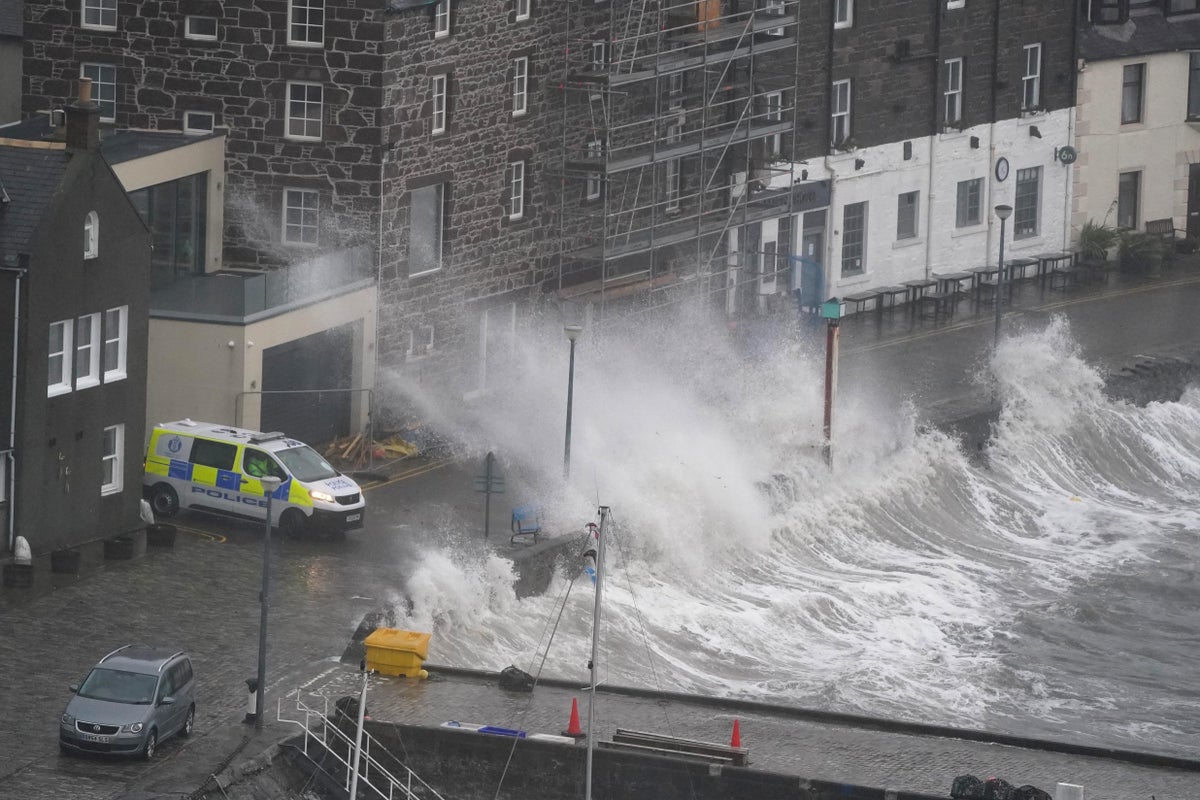
A rare red weather warning has come into force and residents of hundreds of homes have been urged to evacuate as Storm Babet batters the country.
Thousands more were left without power and facing flooding from “unprecedented” amounts of rain.
The second named storm of the season sparked warnings of major flooding, landslides and the prospect of record rainfall as it swept across Scotland before spreading into northern and eastern England later.
The red warning for rainfall in areas of eastern Scotland means there is a danger to life from the severe weather.
The Met Office has warned some communities could be cut off for several days by severe flooding, while The British Geological Survey has warned the storm could also cause landslides in Scotland.
Angus Council, responsible for a large area in the east of Scotland north of Dundee, said residents in 335 homes in Brechin and a further 87 homes in Tannadice and Finavon will be asked to evacuate due to risk of severe flooding.
Three rest centres have been set up in the area, with people urged to take their own sleeping bags, pillows and blankets.
But one resident said he would stay put, while others were pictured building their own flood defences with sandbags.
John Stewart, 82, of Brechin, told the PA news agency he will not be leaving his home should the local authorities attempt to evacuate him.
Mr Stewart, who previously had a wall built around his garden to protect his home, said: “I won’t be leaving because my wife won’t go.”
A statement from Angus Council said: “Over the past few days, resilience colleagues have been working with Sepa to identify areas at most risk of flooding, due to the unprecedented level of rain that is expected to fall across Angus.
“As a result, we have identified approximately 335 homes in Brechin, and an additional 87 homes in Tannadice and Finavon where residents will be asked to evacuate for their own safety.”
Scotland’s Deputy First Minister warned Storm Babet could hit more parts of Scotland in the coming days.
Speaking to BBC Radio Scotland, Shona Robison said: “We are only at the start of this weather event – that’s really important for people to appreciate.”
“There is the risk, danger, and possibility of more areas being affected so we will make sure that any changes are communicated as quickly as possible.
“The services are doing their best to act as quickly as they can.
“Everybody is working very, very hard to make sure particularly those vulnerable people are supported to leave their homes.
“Those that are vulnerable will be put up in hotel accommodation.”
Angus Council said schools will be shut on Friday to “ensure the safety of children, young people, parents, and school staff”.
Neighbouring Aberdeenshire Council also announced rest centres had been set up before the weather warning came into effect in the region from 6pm.
The council has also postponed funerals until next week as “it is neither safe for mourners or staff”.
The Met Office extended its red weather warning from Aberdeenshire and Angus in eastern Scotland to cover the area north of Perth and Aberfeldy on Thursday.
Around 10,000 homes in Scotland lost power due to the storm, according to the Scottish and Southern Electricity Networks (SSEN).
The energy provider said it had restored services to 7,000 homes and engineers were “working to reconnect” around 3,000 more properties.
Mass train cancellations have been imposed by ScotRail, expected to last from Thursday until Saturday.
The storm could bring up to 220mm of rain in some areas of eastern Scotland, an amount close to the highest ever 24-hour total for a “rainfall day”, Met Office figures show.
Some 238mm of rain was measured at Sloy Main Adit in Argyll & Bute between 9am on January 17 1974 and 9am the following day.
The storm is expected to rage overnight and into the weekend, with amber warnings for wind and rain issued for parts of northern England, the Midlands and northern Wales from noon on Friday to 6am on Saturday.
But amber warnings still raise the prospect of injuries and danger to life, power cuts and damage to buildings and flooding.
A yellow warning for Northern Ireland is also in place from 3am on Friday to 9am on Saturday.
A further yellow rain warning covering the north and east of England and north Wales is also in place from midnight on Thursday to 6am on Saturday.
Storm Babet hit Ireland on Wednesday after sweeping in from the Atlantic, bringing with it heavy rainfall and causing extensive flooding in parts of the country.
Members of the Irish Defence Forces were deployed in the town of Midleton, Co Cork, in the south of Ireland, where more than 100 properties were flooded.
Cork County Council said more than a month’s worth of rain had fallen in the space of 24 hours, leading to unprecedented flooding, saturated land and high river levels across the county.







